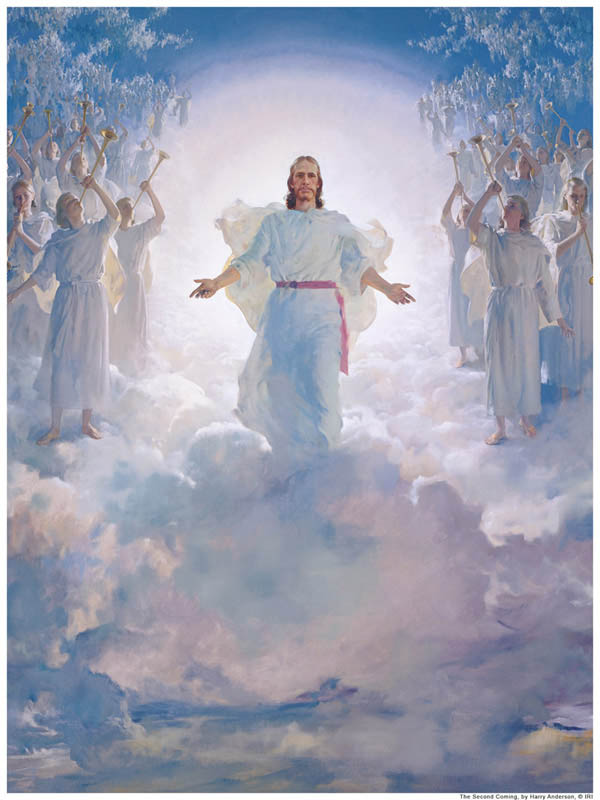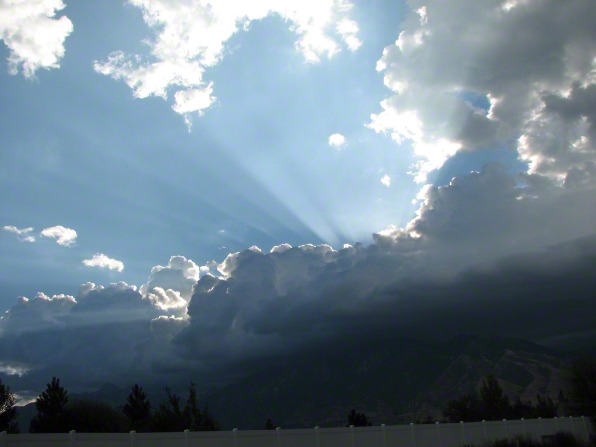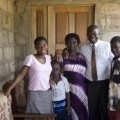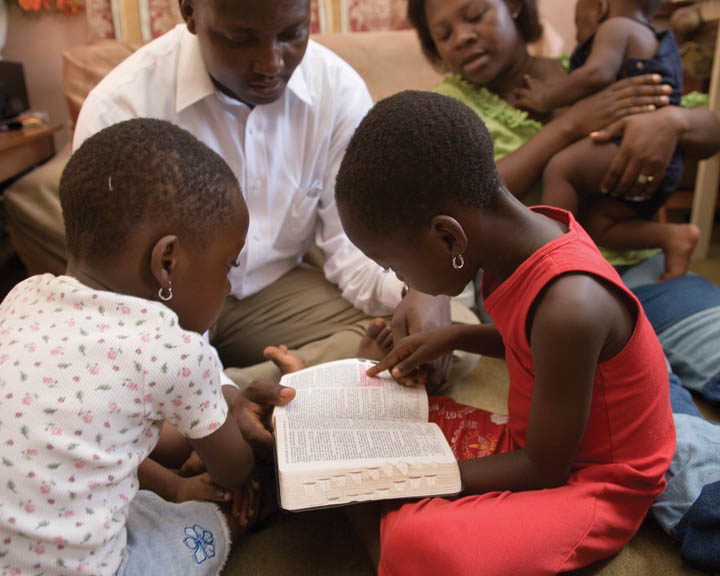Heaven is for Real is a book written by a minister whose son started to describe his visit to Heaven while in surgery. I’ve been fascinated by the reactions of various religious leaders towards the book, which is now a movie. Many clergy members seemed alarmed by the child’s report because it contradicted things they didn’t teach. While Mormons don’t believe all that the child remembered (Mormons don’t believe angels have wings, for instance), and don’t consider the movie doctrinal evidence, much of what I’ve read, not having seen the movie or read the book, seems to fit with Mormon beliefs. These include beliefs of eternal families, which I will address next week, the individuality of God, Jesus, and the Holy Ghost, and the ability of those who do not appear to have been “saved” while on earth to get to Heaven anyway.
 The Mormon view of Heaven is that it is a wonderful place, well worth the effort to get there. Let’s take a look at what awaits you when the time comes-because Mormons know that Heaven is for real.
The Mormon view of Heaven is that it is a wonderful place, well worth the effort to get there. Let’s take a look at what awaits you when the time comes-because Mormons know that Heaven is for real.
First, Mormons believe that practically everyone will end up in Heaven. Only the sin against the Holy Ghost is unforgivable. Studies have shown that Mormons are more likely than other faiths to believe that those who are not of their faith in this life can still go to Heaven, and that is the result of our inspired doctrines. While the study showed most people do believe you can get to Heaven even if you belong to a different church, they sometimes believe that only applies to certain churches. Few religions today formally teach that Heaven is very inclusive—but Mormons do.
Now, we do know, from the Bible, that there are certain requirements for entering into God’s presence. However, Mormons believe that Heaven isn’t all one level. This just makes sense. After all, we’re not all equally valiant in this life and we don’t all share the same lifestyle preferences. If we’re going to be happy in Heaven, we’re going to need to have it be a place where we are comfortable.
The Bible tells us that there are different levels of Heaven. Paul gave a sermon to the Corinthians, who did not believe in resurrection. He tried to help them understand why it was not possible to be Christian and not believe in a resurrection. As he spoke, he also explained how Heaven would work:
There are also celestial bodies, and bodies terrestrial: but the glory of the celestial is one, and the glory of the terrestrial is another. There is one glory of the sun, and another glory of the moon, and another glory of the stars: for one star differeth from another star in glory.
So also is the resurrection of the dead. It is sown in corruption; it is raised in incorruption (1 Corinthians 15:40-42).
 We can partner this with Jesus’ own explanation: “In my Father’s house are many mansions” (John 14:2).
We can partner this with Jesus’ own explanation: “In my Father’s house are many mansions” (John 14:2).
When I was in school, a friend of mine said he prayed about my church and received a witness that it was true. However, he admitted he just didn’t want to live the way Mormons lived, so he chose to forfeit the benefits of living according to God’s plan in order to enjoy the temporary worldly pleasures of life. When we die, we will still be ourselves. Nothing magical will happen to make us perfect people who will enjoy living differently than we do now. My friend would be most uncomfortable spending eternity living a way he didn’t want to live. For that reason, having three levels of Heaven is both fair and kind. My friend can live surrounded by others who enjoy his lifestyle choices, but those of us who long for a higher standard won’t have to encounter his choices on a regular basis. We will end up in a place that is natural and comfortable for us and even the lowest level of Heaven will be a place of joy and peace we can’t begin to imagine here.
As all human beings inherit different circumstances, Mormons believe that a just and merciful God will account for our varying degrees of knowledge and access to truth. With this in mind, Mormon scripture teaches that all will eventually “enjoy that which they are willing to receive,” and to those that so desire, “all that [the] Father hath shall be given unto” them (Doctrine and Covenants 88:32; 84:38). In other words, a person’s reward in the afterlife will be determined by what they really desire in this life. To those who most desire to follow God and live as He lives, the New Testament promises that they shall be “heirs of God, and joint-heirs with Christ” (Romans 8:17). Latter-day Saints believe this includes eternal family relationships. Mormon scripture teaches that the “same sociality which exists among us here will exist among us there [in eternity], only it will be coupled with eternal glory” (Doctrine and Covenants 130:2). The promise of growing to become more like God and ultimately returning to His presence with our families motivates Latter-day Saints to do their best to live according to the teachings of Jesus Christ (Heaven, Mormon Newsroom, LDS.org).
The Celestial Kingdom
For Mormons, this is the ultimate goal. Those who come to this kingdom will live with God and Jesus Christ forever. Mormons do not accept the “once and done” theory of exaltation, however. They do accept Jesus Christ as their Savior, but Jesus taught us that this is not enough. He said that if we love Him, we must keep His commandments. Throughout our lives, we will have the opportunity to make many choices. Those choices reflect our love for Jesus and God, our priorities, and our willingness to give up our favorite sins and to sacrifice in order to keep the commandments.
A rich young man approached Jesus and asked how to be saved. Jesus outlined several commandments, but the young man protested that he had been doing all those things since he was a child. Jesus raised the bar—he suggested the young man give away all his wealth to the poor. While the young man loved God enough to keep the commandments that didn’t ask too much of him, this was further than he was willing to go. His reluctance to do so revealed the depth of his true conversion, and so he walked away, turning his back on the eternal promises of God made to those who love Him best. He was, in fact, like my friend, who wanted to love God, but who loved certain worldly things more.
 “Not every one that saith unto me, Lord, Lord, shall enter into the kingdom of heaven; but he that doeth the will of my Father which is in heaven.” (Matthew 7:21, KJV of the Bible)
“Not every one that saith unto me, Lord, Lord, shall enter into the kingdom of heaven; but he that doeth the will of my Father which is in heaven.” (Matthew 7:21, KJV of the Bible)
This does not mean works alone will get you into Heaven. If you did good deeds all day, it would have had no impact had the Savior not atoned for our sins; nor would it do any good if we did them for any reason other than love for God and for Jesus Christ. Our works are a reflection of a love for God so great we put it before our own desires.
In this highest level of Heaven, we will be permitted to keep our families. They will continue to be ours for all of eternity, one of God’s greatest gifts to His most faithful children. The joy and success of this kingdom is dependent on those being there being the kinds of people who love God and want to live the way He taught us to live.
Terrestrial Kingdom
This kingdom is one level below. It is where most people in the world will end up. Even though they will not be permitted to be with God enjoying His full presence, they will be able to receive visits from Jesus Christ. Mormons who didn’t fully commit themselves to the gospel will be here. This kingdom will also host those who had the opportunity to learn the gospel but rejected it during their lifetime, but accepted it once they died and were taught the truth. In general, these will be moral and good people who allowed themselves to be sidetracked by the world.
Telestial Kingdom
This last kingdom in Heaven is for those who refused the gospel of Jesus Christ even after death. Knowing it is true will not be enough for some—they will want to continue in their sins and to stay away from truths they didn’t want to be true. Sadly, there will be many who fall into this category, but even they will live a more wonderful life than they had on earth. It is still a place of happiness.
As mentioned, an additional group of people who knew without a doubt the gospel was true, because they received a personal visit from Christ Himself, but who rejected it anyway (thus committing the “sin against the Holy Ghost”), will not be permitted to enter Heaven. They are the openly defiant. This is a small group of people.
Now, you may have noticed there are some people missing from these lists. For instance, what happens to children who die before they are old enough to make a decision for themselves? What about people who never even heard of God or Jesus Christ? If God is truly loving and fair, what will He do for them?
Mormon Temples
Mormons know God is completely fair and loving. He planned that children who die younger than age eight will not be held accountable for any choices they made on Earth. They are permitted to enter God’s presence. Those who died older than age 8, who did not have the opportunity to make a decision for Christ during mortality, will be taught in Heaven and then be allowed to choose. It was mentioned above that some people rejected the gospel in this life, but repented of that decision after death. Those people also receive a spiritual education.
Since the Bible makes it clear we must have several saving ordinances in order to achieve exaltation to the Celestial Kingdom, including baptism. Since these must be done on Earth, God planned a way to make this possible for those who died without them.
For for this cause was the gospel preached also to them that are dead, that they might be judged according to men in the flesh, but live according to God in the spirit (1 Peter 4:6).
Else what shall they do which are baptized for the dead, if the dead rise not at all? why are they then baptized for the dead? (1 Corinthians 15:29).
This last question, offered without details, demonstrates that people knew about this practice. They simply hadn’t stopped to wonder why they were doing it. God wants us all to have a fair chance to return home. Inside of Mormon temples in modern times, Mormons perform, as volunteer proxies, these services to their dead. They are baptized and receive other ordinances on behalf of those who died without them or who were baptized, but by someone without the proper authority.
This does not automatically make them Mormons. It is offered only to give them the opportunity to receive the fullness of the gospel. The person for whom the baptism was performed must accept or reject the gift, just as he would have accepted or rejected an offer of baptism on earth. If he rejects it, it will be as if it never happened. If he accepts it, it is as if he received it himself on earth. It is the only possible way to make everything fair.
Learn more about this practice of baptism for the dead.
There is so much more to share than we can possible cover in one article. Next week, I will share more about the wonderful gift of eternal families. In the meantime, you might want to read a little more about the Mormon view of Heaven from these sources:
About Terrie Lynn Bittner
The late Terrie Lynn Bittner—beloved wife, mother, grandmother, and friend—was the author of two homeschooling books and numerous articles, including several that appeared in Latter-day Saint magazines. She became a member of the Church at the age of 17 and began sharing her faith online in 1992.





